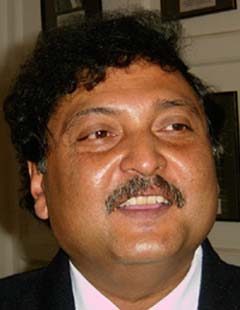A free market in education talked about in London and Newcastle – and being done in India
On Saturday (March 16, 2002) I attended a day-long meeting (“Private education: the poor’s best chance”) at the Institute of Economic Affairs. This was one of two meetings (the other being in Newcastle) marking the launch of the E.G.West Centre For Market Solutions in Education, the Director of which is Professor James Tooley.

Professor James Tooley
James Tooley is one of my favourite people. He has discovered a whole world of private sector educational success being achieved by the world’s poor, in places like India and South Africa, and is busily telling this story back to the world, hence the E.G.West Centre.
The final speaker in the morning was Fazalur Khurrum, President of something called the Federation of Private Schools Management, India, which is based in Hyderabad. The story he told was of a hubbub of small private schools in the Indian city of Hyderabad.
Before him was Dr Sugata Mitra, the Director of Research for the Indian free-market-education giant NIIT. He was the star performer of the day. NIIT can see the day fast approaching when it will have gone as far as it can in educating the kind of Indians who are easy to reach and can afford to pay individually serious money. What about the massed millions of India’s (and for that matter the world’s) seriously poor?
Dr Mitra talked about a fascinating project, in which he stuck an internet-connected PC in a wall, protected by see-through armour plating, in various Indian versions of the back of beyond, and awaited results.
A smart and adventurous poor kid sees the computer. He starts pushing buttons. Other kids assemble and join in. Their poor fathers and uncles watch from behind. Their poor mothers and aunts watch from a distance. (He showed some film of all this, and it was like watching a wildlife documentary, with different humans behaving in different, yet classically human ways.) Within a few days there were a cluster of computer literate children helping each other to have fun and find out about the world, and learning about computers. All this was done by the machine and by the juvenile punters. No “staff” were involved. Dr Mitra watched it all from his office in New Delhi, through a video camera, and by eavesdreopping on the computer. He calls this his “hole in the wall” project.

Dr Sugata Mitra
I could go on. On Sunday I did, at unbloggable length, partly provoked by the embarrassingly boring British people who talked after lunch. The lunch only seemed free; they were the price. What they said wasn’t even fluorescent idiocy – that would have been interesting. It was just generic brand idiocy. For that you’ll have to wait until the Libertarian Alliance (by which I mean me) gets around to toning the insults down and publishing it all as an Educational Note.
A final point. A big reason why even very poor people prefer paying for private education in India is that this way their kids get a good start learning English. In Indian government schools, teaching English to children under ten – even teaching in English – is forbidden.



